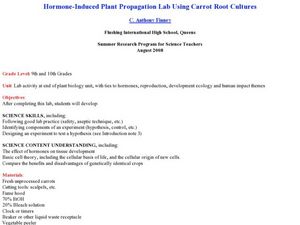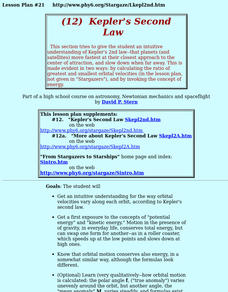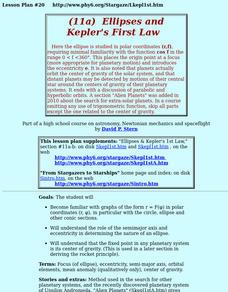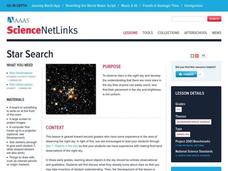Curated OER
Newton's Second Law: Mass-Acceleration Relationship with Dynamics Carts
Young scholars form their own hypothesis about the relationships between force, mass, and acceleration for their dynamics cart system. They collect data and express it in a graphical format to visualize the relationships.
Curated OER
Bouncing Balls
Students make observations of a bouncing ball and study how it travels. In this height lesson students complete a lab activity and describe and explain the motion of the ball.
Curated OER
Enzymes in Action: An Inquiry Approach to the Effects of Enzymes
Students experiment with enzymes as key components of chemical reactions in all living things through this series of lessons.
Curated OER
Pollen Collection And Identification
High schoolers investigate plant reproduction, pollen collection and identification. They collect pollen samples over a twenty four hour period and examine them under a microscope.
Curated OER
Cosmic Collisions and Risk Assessment
In groups, young scholars create their own scientific impact experiments using ordinary materials, and observe and measure results with a variety of impacting bodies and velocities.
Curated OER
Water and Ice
Students explore what happens to water as it goes from solid to liquid and back. In this state of matter lesson plan, students observe, measure, and describe water as it changes state.
Curated OER
Hormone-Induced Plant Propagation Lab using Carrot Root Cultures
Students evaluate the importance of hormones in living things. In this biology activity, students experiment on carrots to differentiate how humans and plants reproduce. They collect data from experiment to answer analysis questions.
Curated OER
Rock Identification Lab
Eighth graders compare and contrast the three different types of rock. In this earth science lesson, 8th graders classify rock samples according to their correct rock type. They design their own data collection table.
Curated OER
I'm Inclined to See; Physics, Math, Science, Experiments, Graphs
Young scholars discover the motion of a sphere on an inclined plane and discover basic relationships involving distance, time, speed(velocity), and acceleration.
Curated OER
Exploring the Landscape
Students determine the monotonicity and concavity properties of a function, then apply the First Derivative Test and draw conclusions about the first and second derivatives from these properties.
Curated OER
#24 Rotating Frames of Reference in Space and on Earth
Students explore rotating frames of reference, focusing on the weightless environment in space and the Coriolis force.
Curated OER
Kepler's Second Law
Young scholars gain an understanding of Kepler's 2nd law--that planets (and satellites) move fastest at their closest approach to the center of attraction, and slow down when far away. They explore the concepts of "potential energy" and...
Curated OER
Ellipses And Kepler's First Law
Students explain that planets actually orbit the center of gravity of the solar system, and that distant planets may be detected by motions of their central star around the centers of gravity of their planetary systems.
Curated OER
Cooler in the Shadows
Young scholars explore how the amount of sunlight and heat change in areas that are shaded.
Curated OER
Kepler's Second Law
Students explore orbital velocities and how they vary along each orbit, according to Kepler's Second Law.
Curated OER
Field Trip to San Bruno
Students contrast a weedy annual grassland of introduced species with an undisturbed, ancient plant community of native bunchgrasses and wildflowers.
Curated OER
Raquel's Radishes
Sixth graders develop a reasonable hypothesis for a fictional science fair investigation. 'Raquel' is going to grow radishes and test for the best way to nourish them. They create a bar graph and write conclusions.
Curated OER
Island Research
Students collaborate to gather information about the geography, history, economy, climate, culture, and other aspects of life on the island of Eleuthera.
Curated OER
Choosing the Greatest American
Fifth graders identify great Americans to nominate as the "Greatest American Who Ever Lived." They examine several sources, print and non-print. Students use gathered information to explain why some sources are used more than others....
Curated OER
Illinois' Habitats Happening
Young scholars use the scientific inquiry method to examine the ecosystems and biomes in Illinois. Using the characteristics of a local habitat, they identify the best conditions for an ecosystem to survive and how a slight change can...
Curated OER
Our Landfill Future
Students use the internet to research articles on garbage, landfills and the environment. In groups, they identify ways to conserve or recycle materials found in landfills and determine the future of a local landfill. They share their...
Curated OER
The Status Of Private Schools In Utah
Students investigate the status of private schools in Utah. This done by looking at the public school system and make comparisons. The question of private schools being better is not clear and many factors need to be considered in...
Curated OER
You Gotta Have Heart
Ninth graders investigate the concept of relations and interpret graphs and tables. They analyze given data and look for a pattern to determine if the numbers represent a function. Students practice solving scientific word problems that...
Other popular searches
- Qualitative Quantitative
- Qualitative Data
- Qualitative Graphs
- Qualitative and Quantitative
- Qualitative Change
- Analyzing Qualitative Data
- Qualitative Maps
- Qualitative Force Diagram
- Qualitative Descriptions
- Qualitative Observations
- Qualitative Energy Bar Chart
- Qualitative vs Quantitative























